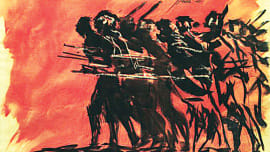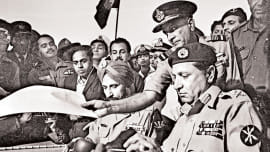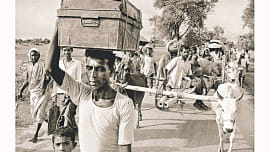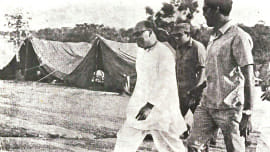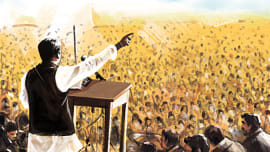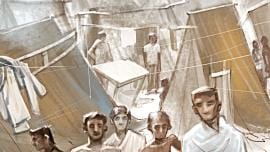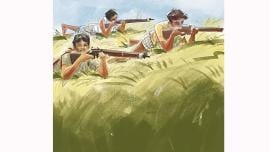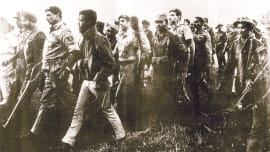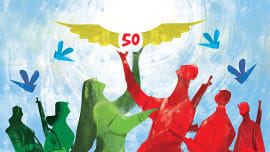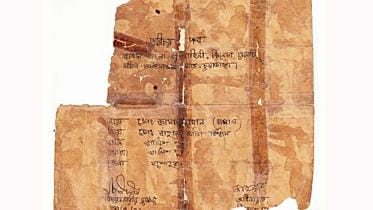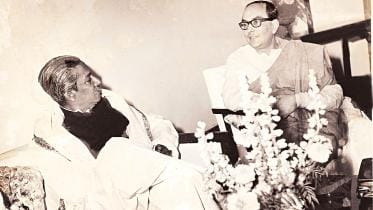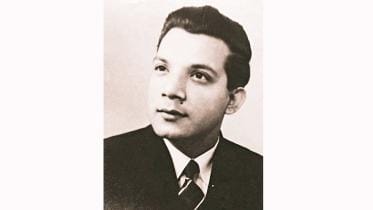1971: Some fragments of memory
15 December 2021, 18:00 PM
50 years of bangladesh
‘I regret that Pakistan has still not formally apologised’
15 December 2021, 18:00 PM
50 years of bangladesh
Retracing the 1971 exodus
15 December 2021, 18:00 PM
50 years of bangladesh
The Chattogram Resistance
15 December 2021, 18:00 PM
50 years of bangladesh
Red stains in green gardens
15 December 2021, 18:00 PM
50 years of bangladesh
MEMORIES OF A MASSACRE / When living is even more painful
15 December 2021, 18:00 PM
50 years of bangladesh
KAMANNA TRAGEDY / They went to sleep never to wake up
15 December 2021, 18:00 PM
50 years of bangladesh
Liberated, at last
15 December 2021, 18:00 PM
Supplements
Celebrating golden jubilee of victory
15 December 2021, 18:00 PM
Supplements
An ode to 1971
15 December 2021, 18:00 PM
50 years of bangladesh
1971: Some fragments of memory
For a couple of months after the 1970 elections everything seemed simple and straightforward.
15 December 2021, 18:00 PM
‘I regret that Pakistan has still not formally apologised’
In conversation with Ayesha Jalal, Mary Richardson Professor of History and Director of Center for South Asian and Indian Ocean Studies at Tufts University, USA
15 December 2021, 18:00 PM
Retracing the 1971 exodus
To commemorate the 50th anniversary of the victory that led to the birth of Bangladesh, attention should be paid to the devastating humanitarian crisis that unfolded during the nine-month war.
15 December 2021, 18:00 PM
The Chattogram Resistance
In an interview with Priyam Pritim Paul of The Daily Star, Major (Retd) Rafiqul Islam Bir Uttam, a Member of Parliament, and Commander of Sector-1 during the Liberation War, discussed some of the initial episodes of the Liberation War of 1971. Below are excerpts of the conversation.
15 December 2021, 18:00 PM
Red stains in green gardens
When a column of Pakistan army vehicles entered Dewrachhara Tea Garden in Moulvibazar in the afternoon of May 3, 1971, most of the workers there were alarmed but had little strength left to do anything about it.
15 December 2021, 18:00 PM
When living is even more painful
April 23, 1971.
A sudden burst of gunshots broke the afternoon silence in the remote Baghoil village of Pabna. All the innocent villagers could do was scream and run to save their lives from the trigger-happy Pakistan military.
15 December 2021, 18:00 PM
They went to sleep never to wake up
Throughout the day, they carried out guerrilla operations against the Pakistan army in different areas and went to sleep without any food at night. As the dawn approached, the occupation forces came stealthily and killed them all when they were asleep.
15 December 2021, 18:00 PM
Liberated, at last
December 16, 1971. Dhaka was gripped by euphoria. People were shouting “Joy Bangla” from the streets to rooftops. Many were hugging each other, celebrating freedom.
15 December 2021, 18:00 PM
Celebrating golden jubilee of victory
50 years ago, on this day, Bangladesh was born out of a bloody war. In the face of a brutal massacre by the Pakistani military, the freedom-loving people of this land, with their unwavering resolve and monumental sacrifices,
15 December 2021, 18:00 PM
An ode to 1971
Joy Bangla! Long live Bangladesh!
It was the clarion call of our Liberation War of 1971 which still fills our heart with a wild thrill.
15 December 2021, 18:00 PM
The 1971 saga
The birth of Bangladesh was not an Indian invention to dismember Pakistan, which attacked northern and western Indian airfields on the evening of December 3, 1971.
15 December 2021, 18:00 PM
Tales of courage and patriotism
It was a long arduous path that we had to wade through to reach the momentous day of glory which was proclaimed by our great leader and Father of the Nation, Bangabandhu Sheikh Mujibur Rahman.
15 December 2021, 18:00 PM
1971: PN Haksar in bridging the security gap
My first meeting with Mr. P N Haksar took place at his residence at 9 Race Course Road, on 30 May 1971. It was a Sunday, 11 in the morning, five days after I reached New Delhi, looking for better understanding of India’s Bangladesh policy.
15 December 2021, 18:00 PM
A year of sacrificial patriotism
It was late afternoon on probably the last Sunday of November 1971. After finishing work for the day at the Netaji Field Hospital in Bakchara village, my father Dr. Sisir Kumar Bose suddenly decided to drive towards the Bongaon border.
15 December 2021, 18:00 PM
How nationalist imaginaries were reconstituted in 1971
It was March 1971, some day between the 7th and the 25th. I was a student of class ten, listening with amazement to the subversive language flying among the crowd gathered in front of General Post Office in Dhaka,
15 December 2021, 18:00 PM
